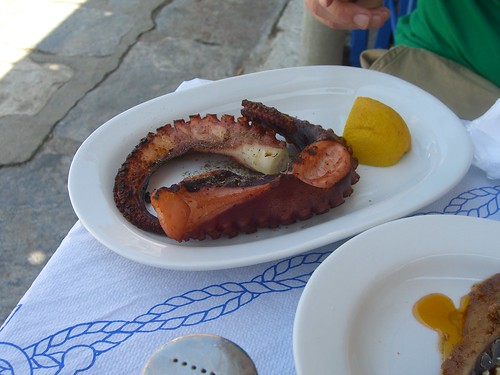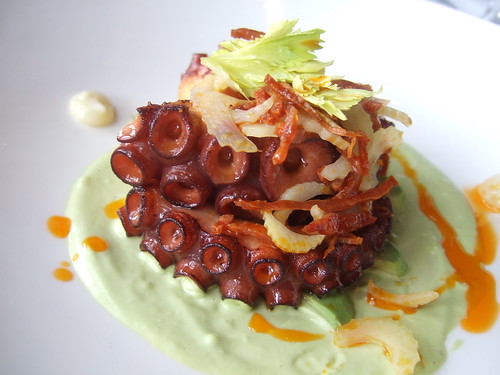The first time I ate octopus was in a sun-drenched back alley on the Greek island of Santorini where tourists — mostly young Americans and Brits — go to act stupid.
The days there begin at night, in some unnamed taverna, usually involving table dancing and copious libations followed by a drunken, groping tryst in a spartan hotel room or, more uncomfortably, on the black volcanic sands of an ancient Aegean beach. Sleep is minimal, and morning demands a brief respite of coffee and "continental breakfast." This is followed by an adjournment back to the beach, often with your companion of the night before, topless depending on nationality (oh, those German girls) and supine yet again, but this time in the worship of Apollo (the sun) rather than of Eros or Dionysus.
In such a cycle of debauchery, food is a necessity rather than a pleasure or diversion. The main goal is to line your stomach with material that will soak up the deluge of alcohol that will flow in the next few hours. With this in mind, the tourist haunts of Greek islands earn their reputation for shoddy food. Hawkers use broken English to shepherd you into their establishment where gooey moussaka is the standard fare.
Read More...And then there's the octopus. It's a dish that's on almost every menu in the Greek islands, and will often be the focus of a restaurateur's tourist-inspired show — if it's not the dancing or the plate breaking, it's a swarthy Greek fisherman pounding a newly caught octopus against a rock to soften its notorious toughness. Preparation is almost always grilled, and when it's done well, octopus is a culinary revelation for even the most sun-burnt and hung-over international tourist.
Grilled octopus is prepared by cleaning fresh octopus, marinating it overnight in a citrus/olive oil/white wine/herb mixture, and then grilling it on an open flame while basting it with more citrus and olive oil. To ensure tenderness, the octopus will often be boiled for 30 minutes to 1 hour before marinating. The end result will be both visually stunning — long, suction-cupped, tapering tendrils of caramelized octopus arms — and wonderfully flavorful. The mild seafood flavor of the octopus combined with the citrus and olive oil, and a dusting of sea salt and oregano, results in a classic and timeless Mediterranean delicacy.
In Houston, a few Greek restaurants have grilled octopus on the menu, usually as an appetizer. Occasionally it seems to be on the menu as an afterthought, mainly to uphold the Greek-menu-street-cred of the restaurant — no octopus means not really a Greek restaurant. Grilled octopus at Houston Greek food joints is usually pretty decent, with a few caveats.
The grilled octopus at Alexander the Great restaurant near the Galleria is a good example of what's good and bad in a typically Americanized and tourist-ified grilled octopus dish. The octopus itself is nicely grilled with a smoky char, and reasonably tender. But in deference to American squeamishness toward eating anything that looks vaguely monster-ish, including things like suction-cupped tentacles, this octopus has been roughly chopped into mouth-size chunks.
The surrounding salad is all quite average, punctuated by a flabby and uninspired dressing of olive oil and citrus, and some obligatory cucumbers, tomatoes and olives. Really, the octopus here could be replaced by chicken, tofu, or shrimp, and there wouldn't be a noticeable difference. Next time I visit I'll just ask for the whole octopus arms on a plate, with a wedge of lemon and sea salt on the side.
On the upper end of the Houston restaurant scale, grilled or braised octopus will often appear on seafood menus. On a recent visit to Tesar's Modern Steak and Seafood in The Woodlands, the menu included a wonderful braised octopus with avocado, aioli, chorizo, and braised celery.
This may seem like an unusual combination of ingredients. But after tasting it, you realize there's a sophisticated thought process involved in the combination of flavors and textures. First, the mild seafoody/briny flavor of the octopus is offset by the rich, buttery flavor of the avocados and the tart aioli. The chorizo flakes offer an extra dimension of spiciness to the dish.
Texture-wise, the braising technique yields an al dente but not chewy hunk of octopus arm. Combined with the creamy avocados and the crunchy slices of celery, there's an inspired formulation of textures in this dish.
Finally, presentation has not been sacrificed — a whole octopus arm is seductively coiled around itself, suction cups protruding unapologetically. The rusty red octopus floats on a slick of pale green of avocado aioli. Flecks of orange chorizo float throughout.
It's the best octopus dish I've had in greater Houston. I'd make the journey out to The Woodlands just for this dish. Although no one will ever mistake The Woodlands for a Greek island, apparently there's still delicious mischief to be had.
A version of this blog entry was originally posted 29 Jan 2010 on the www.29-95.com website.








